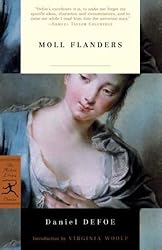Moll Flanders: The Fortunes and Misfortunes of the Famous Moll Flanders
Daniel Defoe, 1721
Random House
368 pp.
ISBN-13: 9780375760105
Summary
Written in a time when criminal biographies enjoyed great success, Daniel Defoe’s Moll Flanders details the life of the irresistible Moll and her struggles through poverty and sin in search of property and power.
Born in Newgate Prison to a picaresque mother, Moll propels herself through marriages, periods of success and destitution, and a trip to the New World and back, only to return to the place of her birth as a popular prostitute and brilliant thief.
The story of Moll Flanders vividly illustrates Defoe’s themes of social mobility and predestination, sin, redemption and reward.
This Modern Library Paperback Classic is set from the 1721 edition printed by Chetwood in London, the only edition approved by Defoe. (From Random House.)
More
As Moll Flanders struggles for survival amid the harsh social realities of seventeenth-century England, there is but one thing she is determined to avoid: the deadly snare of poverty. On the twisting path that leads from her birth in Newgate Prison to her final prosperous respectability, love is regarded as worth no more than its weight in gold; and such matters as bigamy, incest, theft, and prostitution occasion but a brief blush before they are reckoned in terms of profit and loss.
Yet so pure is her candor, so healthy her animal appetites, so indomitable her resiliency through every vicissitude of fortune, that this extraordinary woman emerges as one of the most appealing heroines in English literature. (From Penguin Group USA.)
Author Bio
• Birth—ca. 1659–1660
• Where—London, England
• Death—April 24, 1731
• Where—London, England
• Education—boarding school and a Presbyterian academy
Daniel Defoe born Daniel Foe, was an English trader, writer, journalist, pamphleteer, and spy, now most famous for his novel Robinson Crusoe. Defoe is notable for being one of the earliest proponents of the novel, as he helped to popularise the form in Britain, and, along with others such as Samuel Richardson, is among the founders of the English novel.
A prolific and versatile writer, he wrote more than 500 books, pamphlets and journals on various topics (including politics, crime, religion, marriage, psychology and the supernatural). He was also a pioneer of economic journalism. (From Wikipedia. Retrieved 5/31/2014.)
Book Reviews
(For helpful customer reviews see Amazon, Goodreads, and Barnes & Noble.)
Defoe’s excellence it is, to make me forget my specific class, character, and circumstances, and to raise me while I read him, into the universal man.
Samuel Taylor Coleridge (1772-1834)
Moll Flanders
[is] a novel in which character is everything and is given the freest play.
E.M. Forster (1879-1970)
On any monument worthy of the name of monument the names of Moll Flanders and Roxana, at least, should be carved as deeply as the name of Defoe. They stand among the few English novels which we can call indisputably great.
Virginia Woolf (1882-1941)
Discussion Questions
1. Why did Defoe choose a woman to be his main character? Do you think she is a believable character? Is Defoe commenting on the female gender in this novel, or humankind in general?
2 .Defoe seemingly contradicts himself when speaking of the Church. How is the Church represented in this novel? Consider Moll’s early life as a warden of the Church through to her redemption.
3. Study the many men that pass through Moll’s life. Are any of them good men? Do any of them respect Moll more than others? Do their social positions and wealth effect the way they view Moll and women in general?
4. Modern day critics have debated over Defoe’s exact intent. Some argue Moll Flanders is a picturesque novel, others say a fictionalized Puritan spiritual work, still others claim it is a bourgeois romance. Some critics liken this novel to a work of irony much like Jonathan Swift’s Gulliver’s Travels. Which analysis makes the most sense?
5. Some critics argue that Moll’s wit and independence prove Defoe’s respect for women while other critics argue Moll’s sinfulness and self-acknowledged depravity show Defoe’s anti-women’s rights view. Which do you agree with?
6. Consider the men Moll steals from, both husbands and victims. Is this a comment on class or gender?
7. After reading of Moll’s spiritual reawakening, do you feel Defoe is a supporter or criticizer of religion? Is he a supporter of any divine providence?
8. Compare and contrast Moll’s marriages before her life and crime and after. What are Defoe’s views on marriage?
9. If you were to consider this a work of irony, what exactly is Defoe criticizing? Is his irony even consistent throughout the novel?
(Questions issued by Random House.)


